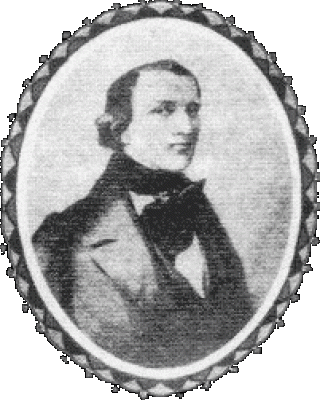
According to the register at the St. Martin´s Cathedral, J. K. Mertz was born on August 17th 1806 on the Lorenzertorgasse in Pressburg. His Name was to be Kaspar Joseph Mertz (in Latin Casparus Josephus Mertz) and not Johann Kaspar as was wrongly noted.
He lived in Pressburg up to 1840 and took part in the music life of the city, mainly by his activities the local Church Music Society (Pressburger Kirchenmusikverein) at the St. Martin´s Cathedral. He appeared regularly at concerts, the so-called "Academies", organized by this society (1834, 1838 - 1841, 1851) and 1840 became its archivist. In that very year he began to pay attention to nearby Vienna, without doubt one of the most important cultural centres of Europe.
After his successful performance at the Royal Theatre in 1840 he was appointed court guitarist of Empress Karoline Auguste. In the following year he made numerous concert trips across Europe (mainly Moravia, Poland and Germany) and got married to the pianist Josephine Plantin. In 1843 the newly wed settled in Vienna where they lived and worked till Mertz´s death in 1856 on October 14th after a long illness.
Undoubtedly J. K. Mertz belongs to the most outstanding guitarists and composers of early romanticism. Toward the end of his days he was awarded the first prize for the best guitar composition (Concertino) at a European competition in Brussels (1856) which was organized by the Russian nobleman and guitar enthusiast Nikolay Petrovich Makarov (1810 - 1890).
Mertz´s extensive work comprised chiefly various compositions for guitar and duets for two guitars as well as for guitar and piano. Apart from his own original music he also arranged music of other composers and popular folksy or folkloric motifs. Only a small part of his compositions was published during his life. His editors forced him to write in simpler style for a wider public, which was against his will and later he refused the publication of his works. Therefore numerous of his pieces survived only as manuscripts.
In Mertz´s work are dominating compositions for 6-string guitar (Zwey Polonaisen und Mazurka, Trois Nocturnes, La Carnaval de Venise, Sechs Schubert´sche Lieder für die Guitare, cycles Bardenklänge, Opern-Revue, Portefeuille für Guitarre-Spieler a Kukuk) and 10-string guitar (Fantaisie Hongroise, Fantaisie Originale, Le Gondolier, Elegie, Concertino, Harmonie du Soir).
After that follows chamber music with guitar in which are dominating guitars duets for terc-guitar and guitar (Am Grabe der Geliebten, Ich denke Dein, Trauermarsch, Unruhe, Wasserfahrt am Traunsee, Ständchen) and duets for terc-guitar and piano (Mazurka, Barcarole, Divertissement über „Rigoletto“). Besides that could be classified in this category also transcriptions of songs for voice with guitar accompaniment (Beliebte Gesänge mit Begleitung der Guitare) and trio for violin (or flute), viola and guitar (Divertissement über „Der Prophet“). Guitar works complement seven books of compositions and transcriptions for cither and one piece for mandolin and guitar.
